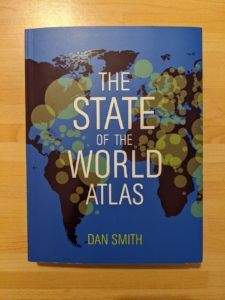The State of the World Atlas by Dan Smith
Written by Ashley Kelmore, Posted in Reviews
Best for:
People who enjoy data visualizations. People interested in where various countries sit on different measures.
In a nutshell:
Six distinct sections provide the numbers on some of the most important and interesting measures, including wealth and poverty, rights, war and peace, health of the people and health of the planet, plus some basic demographic data.
Worth quoting:
“Many [refugees], despite their hardships, and despite all states’ legal responsibilities under the 1951 Refugee Convention, receive little of no comfort upon arrival.”
Why I chose it:
I am a sucker for quality data visualization, and for maps. Put the two together and *chef’s kiss*
Review:
This is primarily a book of maps and data, with very little narrative. And of course, the decision of what data to use, and what sources, carries with it the author’s own biases and concepts of what data matters most. So with that caveat, I’d argue that this is an interesting basic look at world data.
Some of the narrative provided – and some of the data, did cause me to raise an eyebrow. Mostly because of the lack of precision around language. For example, at one point the author states “Growing numbers of children and adolescents have mental health problems of some degree…” I’d argue that should read “have diagnosed mental health problems.” And the few pages on the ‘obesity epidemic’ start from some assumptions that I just don’t think hold.
Also, there isn’t a section looking at race and racism; there’s one page looking at genocide risk which, obviously hugely important, but nothing at all on de facto racism. In fact, and I suppose this is a bit of a necessity when putting together such a broad book, but the discussions around women’s rights, LGBTQ+ rights, and global majority rights are really limited to proxies that look at the law, as opposed to how things work in practice. Like, the US is listed as being a functioning democracy, and technically all adults (depending on felony conviction status) have the right to vote, but we all know that ACCESS to the vote varies dramatically. Things like that aren’t captured here.
That said, if one approaches the data as a starting point, and then does their own research into the origin of the data and what might have motivated the gathering and presenting of the data in the way used, then I think this is an interesting book to flip through and the revisit when thinking about related issues.
Recommend to a Friend / Donate it / Toss it:
Not sure I’d recommend it, but I will be keeping it as a reference for myself.

